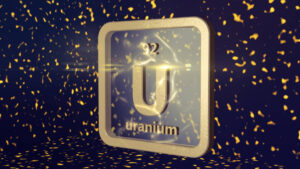Bargain Barrel: Uranium prices just touched decade highs. Here are 9 dirt cheap ASX stocks with upside

Pic: Getty
- Cheap ASX uranium stocks now in demand as spot price hits $US60/lb
- US may ban its nuclear power plants from buying enriched uranium from Russia
- Projected uranium supply shortfall just keeps getting bigger
On March 11 the uranium spot price gained a remarkable 13% to $US60/lb – its highest point since 2011.
$US60/lb is also the magic number a lot of aspiring developers use to justify the profitability of their future operations, so this was a big deal.
The trigger for this spike? Possibly news that the US is looking to ban its nuclear power plants from buying enriched uranium from Russia.
Russian #uranium and enrichment now banned for new transactions. Supply shock is coming and even existing contracts will not likely be honoured imho
https://t.co/6CWLdHI6gl— Kevin Bambrough (@BambroughKevin) March 16, 2022
Meanwhile, nations around the world are scrambling for base load energy sources that aren’t coal or oil and gas related. That leaves only nuclear.
The projected uranium supply shortfall just keeps getting bigger.
Over the past year, most established uranium stocks have made solid, but not remarkable gains. Could the real upside for ASX companies still be on its way?
Here’s a run-down of nine cheap, sub-$15m market cap stocks with exposure to this exciting thematic.
THOR MINING (ASX:THR)
Market Cap: $10m
Cash on hand: $2.9m (Dec 31)
The diversified explorer has three projects within a historic high-grade uranium-vanadium mining district in Colorado, known as the Uravan mineral belt.
Uravan has produced +85 million pounds of uranium oxide and 660 million pounds of vanadium over the past 100 years.
The company is still working through approvals for an initial drilling program at the ‘Wedding Bells’ project, it said earlier this month.
This program was going to target high grade uranium and vanadium at the ‘Rim Rock’, Groundhog’ and ‘Section 23’ targets.
Thor believes there to be “high potential” at Section 23 which, because it was previously held by the government, has never been drill tested.
“This company is a sandstone paleo-channel play which will be a lot cheaper to process,” says stock picker Noel Ong.
“A combination of uranium and vanadium which will be great when the time comes to valuing extra credits.”
ADAVALE RESOURCES (ASX:ADD)
Market Cap: $14.5m
Cash on hand: $2m (Dec 31)
Small cap explorer ADD has re-joined the uranium rush.
Its ‘Lake Surprise’ project — ~90km from the Four Mile uranium mine in South Australia — has been in the portfolio since 2006, with a total of 446 drill holes completed across several anomalies to 2011.
A 600m wide, 2km long anomaly was defined but, since then, internal reviews have identified a far stronger, almost untouched gamma anomaly to the southeast of historical drilling.
This 1.8km by 8km target is also coincident with uranium-rich rock chips and a helium occurrence.
The correlation between helium and uranium occurrences is supported by known neighbouring uranium deposits, ADD says.
Planning for the next phase of exploration is underway, it says.
GLADIATOR RESOURCES (ASX:GLA)
Market Cap: $12m
Cash on hand: $1.1m (Dec 31)
GLA has two key uranium projects in Tanzania, Minjingu and Mkuju.
On March 11 it appointed a specialist mining team, MSA Group, to accelerate these projects.
The flagship Mkuju includes the ‘Likuyu North’ deposit and uranium anomalies at Grand Central, Likuyu South and Likuyu North, the company says.
The main game now is updating the resource at Likuyu so it is JORC 2012 compliant – a must have for ASX listed explorers.
Additional targets will be ranked, prioritised, and then systematically explored by auger drilling trenching and drilling.
At Minjingu, a drilling program announced January “encountered difficult ground conditions necessitating a change from reverse circulation to aircore drilling, causing some delays”.
On the upside, this allowed the company to complete a planned radiometrics survey to improve and potentially expand targeting of drill locations, which has now been completed “with very encouraging results”.
“Data generated from the radiometric survey has already led the company to reassess and refocus the drill program to test additional targets situated in the northern and southern parts of the licence,” GLA said late Feb.
“This is expected to be undertaken in coming weeks.”
ARGONAUT RESOURCES (ASX:ARE)
Market Cap: $7m
Cash on hand: $2.1m (Dec 31)
ARE recently acquired a substantial package of uranium exploration licences in South Australia and the Northern Territory via a 100% held, unlisted public company, Orpheus Minerals.
Argonaut is planning to list Orpheus on the ASX as a uranium explorer sometime this year.
In South Australia, the ‘Frome’ project involves three exploration licences in the Frome Embayment area, arguably the most prospective region in Australia for sandstone-hosted uranium deposits.
Frome has two walk-up, high priority drilling targets plus at least six early-stage drilling targets. ARE is currently commencing the permitting process required for drilling.
‘Mount Douglas’ in the NT features a recent discovery of outcropping uranium-bearing rocks returning assays of 750 to 1,000ppm uranium, “possibly the highest uranium values yet obtained around the Mount Douglas Outlier”, ARE says.
“This uranium discovery clearly warrants follow-up drilling to test the extent of mineralisation,” it says.
“Orpheus has plans to drill at Mount Douglas shortly after the proposed IPO.”
DELECTA (ASX:DLC)
Market Cap: $13m
Cash on hand: $2.9m (Dec 31)
The explorer chose a good time to hit the ground at the Rex uranium project in Colorado, as optimism surrounding future uranium pricing grows.
During the December quarter DLC completed an early-stage exploration program at Rex, with rock sample results confirming the presence of “high-grade uranium and vanadium mineralisation on old mine dumps and around the abandoned mine portals”.
The company also acquired a substantive database of historic drill and mining information, “and evaluation of this data has enabled drill targeting to commence”.
The company is currently suspended pending the announcement of a material acquisition.
CAULDRON ENERGY (ASX:CXU)
Market Cap: $8.4m
Cash on hand: $1.3m (Mar 14)
When the WA state government implemented a ban on most new uranium mines in 2017, CXU stopped work at its flagship ‘Yanrey’ uranium project and began searching for other dirt to play with.
It now has a historic gold project called ‘Blackwood’ in Victoria and a silica sands play called ‘Ashburton’ in WA. It is also poking around Yanrey again, which is a lot more interesting now that uranium prices are on the move.
While government support (or lack thereof) for new mines has not changed, a recent survey uncovered a bunch of “highly prospective targets for follow-up drilling” at Yanrey.
“Our ultimate objective is to explore for uranium mineralisation amenable to extraction by ISR,” CXU exec chairman Simon Youds says.
“Economic deposits of sandstone-hosted, palaeochannel-style uranium can be mined using ISR in the lowest cost quartile of uranium mined globally.”
“This characteristic makes these deposits extremely attractive for mining at any uranium price and necessarily must form the basis of any uranium resource portfolio.”
Yanrey exists within a larger uranium province that is slowly being uncovered, Youds says.
“There is potential here for a scale comparable to the best uranium-endowed province globally and that, with astute leadership, Western Australia is at the threshold of a new energy resources boom.”
RESOLUTION MINERALS (ASX:RML)
Market Cap: $9.5m
Cash on hand: $2.8m (Dec 31)
RML is mainly focused on finding monster copper-gold deposits, but it does have a couple of projects prospective for uranium in the NT.
At the ‘Wollogorang’ copper-cobalt-uranium project mid-tier copper producer OZ Minerals (ASX:OZL) is currently spending $5m on exploration to earn a 51% interest.
The area surrounding RML’s ‘Benmara’ battery metals project, also in the NT, is highly prospective for uranium with the 51.9-million-pound Westmoreland uranium deposit nearby.
Additional uranium occurrences have also been mapped within 2km of the Benmara tenement boundaries.
SABRE RESOURCES (ASX:SBR)
Market Cap: $5m
Cash on hand: $4.2m (Dec 31)
In Feb, SBR completed the acquisition of private company Chalco, which owns bunch of projects including uranium tenements in the NT.
“Chalco holds two tenement applications in one of Australia’s most prospective uranium areas, the Ngalia Basin of the Northern Territory, both of which are immediately along strike from existing uranium resources,” SBR CEO Jon Dugdale says.
The ‘Dingo’ tenement is highly prospective for sandstone-hosted, uranium–vanadium deposits analogous to the nearby ‘Bigrlyi’ deposit.
‘Lake Lewis’ is considered prospective for calcrete style mineralisation, analogous to the neighbouring ‘Napperby’ and ‘Cappers’ uranium resources.
Core Lithium’s (ASX:CXO) Napperby contains a JORC 2012 Inferred Resource of 9.54Mt at 382ppm U3O8 for 8.03 Mlb of contained U3O8.
HARANGA RESOURCES (ASX:HAR)
Market Cap: $9m
Cash on hand: $6m (Dec 31)
HAR listed on the ASX earlier this year with a bunch of uranium and gold projects in West Africa.
The company considers its ‘Saraya’ uranium project in Senegal to be both an advanced-stage exploration project and large greenfield exploration project.
“On one hand we have mineralisation showing good results, partially drilled around 2010 by French government-owned Areva and relinquished due to falling uranium prices,” exec chairman Peter Youd told Stockhead in January.
“On the other hand, we have a large exploration permit, showing high order uranium anomalies, some with preliminary testing but most left unexplored.
“We have negotiated with Areva’s successor company, Orano, for access to their data room in Paris.
“We will be reviewing this data in coming months with a view to determining the scope for outlining immediate resources and forming the basis for ongoing exploration programs.”
HAR is now planning permit scale geochemical termite mound sampling, infill auger sampling, and orientation air core drilling “in order to assess the rooting of selected anomalies”.
Related Topics

UNLOCK INSIGHTS
Discover the untold stories of emerging ASX stocks.
Daily news and expert analysis, it's free to subscribe.
By proceeding, you confirm you understand that we handle personal information in accordance with our Privacy Policy.








